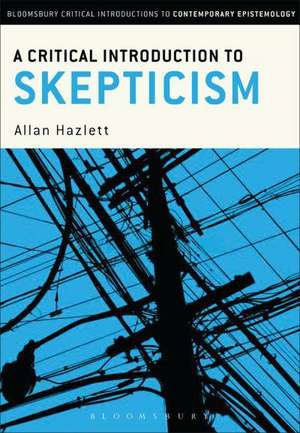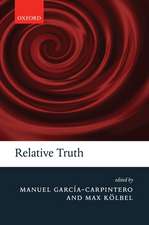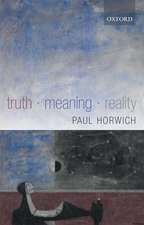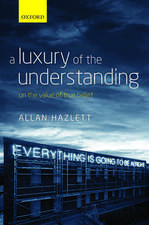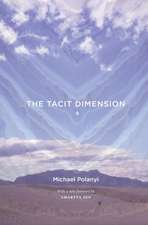A Critical Introduction to Skepticism: Bloomsbury Critical Introductions to Contemporary Epistemology
Autor Allan Hazletten Limba Engleză Paperback – 12 mar 2014
| Toate formatele și edițiile | Preț | Express |
|---|---|---|
| Paperback (1) | 237.75 lei 3-5 săpt. | |
| Bloomsbury Publishing – 12 mar 2014 | 237.75 lei 3-5 săpt. | |
| Hardback (1) | 890.72 lei 6-8 săpt. | |
| Bloomsbury Publishing – 12 mar 2014 | 890.72 lei 6-8 săpt. |
Preț: 237.75 lei
Preț vechi: 273.34 lei
-13% Nou
Puncte Express: 357
Preț estimativ în valută:
45.49€ • 49.57$ • 38.33£
45.49€ • 49.57$ • 38.33£
Carte disponibilă
Livrare economică 02-16 aprilie
Preluare comenzi: 021 569.72.76
Specificații
ISBN-13: 9781441140531
ISBN-10: 1441140530
Pagini: 224
Dimensiuni: 156 x 234 x 15 mm
Greutate: 0.36 kg
Editura: Bloomsbury Publishing
Colecția Bloomsbury Academic
Seria Bloomsbury Critical Introductions to Contemporary Epistemology
Locul publicării:London, United Kingdom
ISBN-10: 1441140530
Pagini: 224
Dimensiuni: 156 x 234 x 15 mm
Greutate: 0.36 kg
Editura: Bloomsbury Publishing
Colecția Bloomsbury Academic
Seria Bloomsbury Critical Introductions to Contemporary Epistemology
Locul publicării:London, United Kingdom
Caracteristici
Introductions to positions and arguments are complemented by additional readings and discussion questions
Notă biografică
Allan Hazlett is Reader in Philosophy at the University of Edinburgh, UK.
Cuprins
Part I: Skepticism1. The Skeptical Persuasion2. The Mode from Dispute3. Our Inirm Understanding4. Our Darkened IntellectPart II: Anti-Skepticism5. The Moorean Persuasion6. Nonclosure7. Skepticism and LanguagePart III: New Directions8. Beyond Propositional Knowledge9. Skepsis and PraxisBibliographyIndex
Recenzii
This book's great success is owed to the philosophical insight and expository skill of its author, whose mastery is manifest in the depth and breadth attained, with crystal clarity and a light touch that will please readers.
Allan Hazlett's book is the best sort of guide to skepticism: both sympathetic and critical in turns, it is thoroughly grounded in recent historical scholarship and displays a sharp eye for issues in contemporary epistemology. This lucid and engaging presentation of the skeptical tradition-from its origin to its present and possible future-successfully captures what makes skepticism an endless source of philosophical fascination.
Marked by a dazzling combination of comprehensiveness, brevity, novelty, clarity, humor, and a refreshing streak of irreverence, Hazlett's introduction to skepticism will make an excellent addition to any course in epistemology and, indeed, to the bookshelf of every thoughtful person who wants to avoid the intellectual doom which, Hazlett argues, accompanies ignorance of the great skeptical and anti-skeptical traditions. Dare I say it? Even skeptics will agree: the more people who know about this book, the better.
Hazlett has produced a wonderfully thorough introduction to skepticism, which has what I consider to be a great deal of pedagogical value for teachers of skepticism at a variety of levels.
This opinionated introduction was missing from the philosophical library. It is useful to students and it poses some challenges to the experts as well. Hazlett maps out the main sceptical and anti-sceptical positions, scrutinizing key arguments by means of a generous selection of quotes.
Allan Hazlett's book is the best sort of guide to skepticism: both sympathetic and critical in turns, it is thoroughly grounded in recent historical scholarship and displays a sharp eye for issues in contemporary epistemology. This lucid and engaging presentation of the skeptical tradition-from its origin to its present and possible future-successfully captures what makes skepticism an endless source of philosophical fascination.
Marked by a dazzling combination of comprehensiveness, brevity, novelty, clarity, humor, and a refreshing streak of irreverence, Hazlett's introduction to skepticism will make an excellent addition to any course in epistemology and, indeed, to the bookshelf of every thoughtful person who wants to avoid the intellectual doom which, Hazlett argues, accompanies ignorance of the great skeptical and anti-skeptical traditions. Dare I say it? Even skeptics will agree: the more people who know about this book, the better.
Hazlett has produced a wonderfully thorough introduction to skepticism, which has what I consider to be a great deal of pedagogical value for teachers of skepticism at a variety of levels.
This opinionated introduction was missing from the philosophical library. It is useful to students and it poses some challenges to the experts as well. Hazlett maps out the main sceptical and anti-sceptical positions, scrutinizing key arguments by means of a generous selection of quotes.
